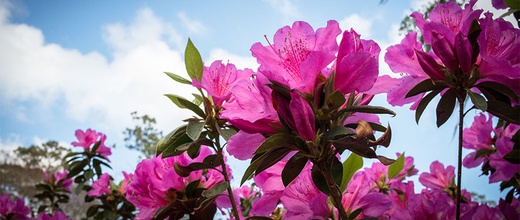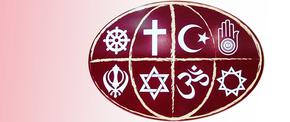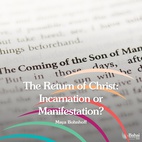The views expressed in our content reflect individual perspectives and do not represent the authoritative views of the Baha'i Faith.
A hundred fifty-six years ago Baha’u’llah, the prophet and founder of the Baha’i Faith, rode out of Baghdad’s Ridvan Garden into the danger of the unknown.
Along with his family, a few of his followers and a retinue of Turkish troops as guards, they went on foot, by wagon and horseback over desert and rugged mountains toward exile and imprisonment. None of them knew whether they would be tortured, starved or executed.
Ultimately, Baha’u’llah’s four-month journey from Baghdad led him further away from his native land and into lifelong incarceration. About that supreme sacrifice, he wrote:
My body hath endured imprisonment that ye may be released from the bondage of self. Set your faces then towards His countenance and follow not the footsteps of every hostile oppressor. Verily, He hath consented to be sorely abased that ye may attain unto glory … – Baha’u’llah, Tablets of Baha’u’llah, p. 11.
Given the circumstances, you might think that Baha’is, when they commemorate the Twelfth Day of Ridvan, view it as a somber, sad observance—after all, it represents the anniversary of a day filled with dire possibilities. But rather than expressing melancholy remembrance, Baha’is joyously celebrate this anniversary as one of the high points of the Baha’i year.
How can that be?
The entire Ridvan Festival commemorates Baha’u’llah’s twelve-day sojourn in the Garden of Ridvan outside Baghdad, during the days before his exile to Istanbul (then known as Constantinople) in Turkey. Accordingly, Baha’is everywhere happily observe the Twelfth Day of Ridvan as a festival of renewal and peace, commemorating the joyful beginnings of the Baha’i Faith and celebrating the first law of that new revelation, Baha’u’llah’s admonition to humanity to stop waging war and come together in unity:
This is the Day in which God’s most excellent favors have been poured out upon men, the Day in which His most mighty grace hath been infused into all created things. It is incumbent upon all the peoples of the world to reconcile their differences, and, with perfect unity and peace, abide beneath the shadow of the Tree of His care and loving-kindness. – Baha’u’llah, Gleanings from the Writings of Baha’u’llah, p. 6.
Despite his declaration of the peaceful, progressive Baha’i principles he taught, and despite the fact that he had committed no crime, Baha’u’llah ultimately suffered forty years of exile, imprisonment and torture.
Those repeated exiles and prison sentences came about as a result of Baha’u’llah’s increasing spiritual influence throughout the entire region, and the large and growing number of followers attracted to the Baha’i teachings. Baha’u’llah’s first banishment, from Tehran in Persia to Baghdad in 1852, and his second exile from Baghdad to Constantinople in 1863, would be followed in rapid succession by two more: later in 1863 from Constantinople to Adrianople (Edirne) in northwestern Turkey near the Greek border; and then ultimately, in 1868 to the barbaric Ottoman penal colony of Akka (Acre) in Palestine, where Baha’u’llah spent most of the rest of his life as a prisoner.
It was springtime in 1863, before Baha’u’llah’s short 12-day sojourn in the Ridvan garden, when his family learned of the government’s banishment order. It mandated the permanent removal of Baha’u’llah from Baghdad, consigning him, his family and followers to a perilous, unknown fate. On the day of departure, mourning and lamenting, with many of them forced by the authorities to stay behind in Baghdad, they felt nothing but sadness, despair and trepidation.
One eyewitness account of that day came from a follower of Baha’u’llah named Mirza Asadu’llah Kashani, who later wrote about Baha’u’llah’s departure from Baghdad amid the thousands of followers who had come to tearfully bid him farewell:
… we were aware of an extraordinary exhilaration, some marvelous exaltation in the atmosphere of that day.
The reason for this phenomenon we were in due time to learn. …
… on the twelfth day, in the afternoon, they went from us, under the escort of Turkish soldiers to an unknown destination. Although Baha’u’llah had commanded the friends not to follow them, I was so loath to let Him go out of my sight, and I ran after them for three hours.
He saw me, and getting down from His horse, waited for me, telling me with His beautiful voice, full of love and kindness, to go back to Baghdad, and, with the friends, to set about our work, not slothfully, but with energy:
Be not overcome with sorrow—I am leaving friends I love in Baghdad. I will surely send to them tidings of our welfare. Be steadfast in your service to God, who doeth whatsoever he willeth. Live in such peace as will be permitted to you.
We watched them disappear into the darkness with sinking hearts, for their enemies were powerful and cruel! Weeping bitterly, we turned our faces toward Baghdad, determined to live according to His command. – cited in Lady Blomfield’s The Chosen Highway, reprinted in Days of Ridvan, A Compilation, pp. 60-61.
During those twelve days in a garden on the Tigris River, Baha’u’llah announced the advent of a new cycle of human progress which would usher in the organic unity of all humanity and the dawn of a new world Faith. As he did so, he transformed the fact of his impending exile from tragedy to triumph.
So each year the worldwide Baha’i community commemorates the eve of Baha’u’llah’s departure from Baghdad, not as a time of sorrow or regret, but as a festival of great joy. Every year the Twelfth Day of Ridvan demonstrates the power of the revelation of Baha’u’llah, the newest prophet of God, to transmute tragedy into triumph, bring forth light from darkness, and wrest victory from seeming defeat:
This is the Voice of God, if ye do but hearken. This is the Day Spring of the Revelation of God, did ye but know it. This is the Dawning-Place of the Cause of God, were ye to recognize it. This is the Source of the commandment of God, did ye but judge it fairly. This is the manifest and hidden Secret; would that ye might perceive it. O peoples of the world! Cast away, in My name that transcendeth all other names, the things ye possess, and immerse yourselves in this Ocean in whose depths lay hidden the pearls of wisdom and of utterance … – Baha’u’llah, Gleanings from the Writings of Baha’u’llah, p. 33.

















Comments
Sign in or create an account
Continue with Facebookor